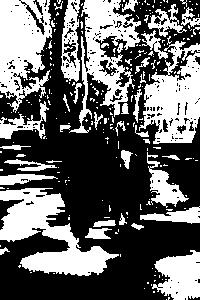The College’s annual Convocation ceremony, marking the official opening of the 213th academic year, was held Wednesday, Sept. 3, in Pickard Theater of Memorial Hall.
In his “Opening of the College” address President Barry Mills reflected on what makes Bowdoin so unique and so beloved by many of its students, alumni and parents.
He began by praising the faculty, not just their high level of scholarship, but also their dedication to students. “Frequently, when I meet alumni of the College, they tell me that a particular faculty member changed their lives,” he said.
Mills also gave a shout out to the staff in dining who reliably produce some of the most highly rated college food year after year. He offered a nod to those departments that make the college tick: facilities, information technology, health and wellness, and security. He acknowledged the role that athletics, residential life and the dean of students’ office play in elevating the quality of life for students. He also complimented admissions, which “brings to us fabulous students from across America and the world.”
In addition, Mills recognized Bowdoin students, and former students. “Our students are passionately engaged in a wide variety of extracurricular activities, issues and controversies that amplify what we do at Bowdoin — activities that are geared to the entire community, our nation, and the world,” he said. And when these students become alumni, they join a group of “important and principled leaders in all walks of life.”
Read Dean Tim Foster’s “Voices from the Past.”
Read Professor of Psychology Sam Putnam’s “The Nature of the Nurture of Nature.”
Mills then turned his attention to some of Bowdoin’s challenges, particularly the importance of the College to continue to incorporate quickly changing technology into its pedagogy and research.
The president also referred to what he called the “overriding theme of my talks over these past years” — the need to ensure that every student who deserves to be at Bowdoin can study here, regardless of their ability to pay the fees. “We have two vital imperatives in my mind,” he said. One is that the college strives to attract, enroll and graduate talented students. The second imperative is for the college to moderate its costs without sacrificing the quality of its education. “Access and opportunity are simply fundamental to our sense of ourselves and to the future success of Bowdoin,” Mills stated.
In closing, Mills said that being president of Bowdoin College is his dream job. “I have a few months left, so the dream continues. But we have a lot of important work to do, so let’s get at it!” Mills received a standing ovation from the audience.
Dean of Student Affairs Timothy Foster, in his address “Voices from the Past,” recounted a story about two Bowdoin students, Phil Hansen and Dave Bayer, who in the early 1960s arranged an exchange with Morehouse College in Atlanta, Ga. In the spring of 1963, nine Bowdoin students traveled to Atlanta for a week at Morehouse, and four Morehouse students arrived in Brunswick. Hansen described the exchange as one of the most “educational experiences” of his life.
“Today,” Foster said, “there are many more opportunities for students to gain first-hand knowledge, and as recent events in Missouri have illustrated clearly, there is still much to learn and still much to improve about America.”
Professor of Psychology Sam Putnam delivered the Convocation Address. An expert in social development, Putnam spoke on the subject of nature versus nurture and what, ultimately, is responsible for shaping us. But Putnam’s address went deeper than looking just to our genes or just to our upbringing, or some combination of the two, to explain ourselves to ourselves. He touched on new, remarkable research that suggests our environments can influence aspects of our genomes, changes that then can be passed on to our offspring.
“Recent research suggests a…fantastic possibility,” Putnam said. “The environments that you encounter not only change your biology — they may change the biology of your children and your children’s children.” Groundbreaking studies have shown that some people who survived famines had grandchildren who were more likely to develop diabetes than descendants of people who had never starved. Additionally, rats raised in “enriched” environments with many opportunities for exploration have proved to not only be better than other rats at learning mazes, Putnam said, they have offspring, and offspring of offspring, who are good at mazes.
The implications of this research are immense, and perhaps, Putnam suggested, should help guide our actions. He told the young college students that their behavior these next four years toward one another might shape not only their peers’ college experience, but also the biology of future generations. “Be excellent to each other,” he advised.
The musical interlude was performed by cellist Sheng Ge ’16, who played an excerpt from Sonata in G Minor for Cello and Piano, Op. 19; IV. Allegro mosso, by Sergei Rachmaninoff. Ge was accompanied by Lopez on piano. Lopez also performed the academic recessional, playing Fantasia in C Major by Josef Haydn.






























